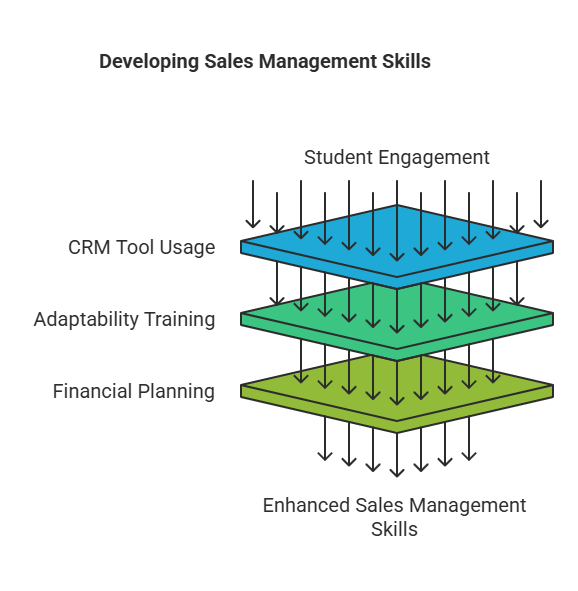Bridge the gap between sales theory and practice with simulation-based learning for entrepreneurs, transform your teaching strategies.
Table of Contents
Why Sales Management Skills Matter for Young Entrepreneurs
Selling is important, but knowing how to manage sales is what builds successful businesses. From leading a team to setting prices and forecasting revenue, sales management skills are essential, yet, most business schools focus on theory instead of practice.
Students learn entrepreneurship concepts, financial modeling, and business strategy, but rarely get hands-on experience in managing sales operations, handling objections, or optimizing sales processes. Without this, they graduate unprepared to lead sales teams or drive revenue growth.
That’s where Startup Wars changes the game. Through simulation-based learning, students practice sales strategies, manage CRM systems, and make real business decisions, all in a risk-free environment. They learn by doing, gaining the skills to lead, sell, and grow businesses successfully.
By integrating experiential learning, business schools can bridge the gap between theory and real-world application, ensuring graduates are ready to manage sales like pros.
Essential Sales Management Skills for Future Entrepreneurs: A Simulation-Based Experience
Knowing how to sell like a pro is important, but managing sales effectively is what truly builds a successful business.

Whether it’s pitching an idea, knowing how to manage sales operations, lead a team, make strategic decisions or optimizing revenue; strong sales management skills separate thriving entrepreneurs from struggling ones. The problem? Most business programs focus on theory, not practice. And let’s be real, you can’t learn to forecast revenue just by reading about it. That’s where Startup Wars changes the game.
Through business simulation games, Startup Wars gives students hands-on experience in a risk-free, interactive environment where they can develop sales management skills. Here’s how:
CRM & Digital Tools: Leveraging Data and Technology for Sales Success
These days, if you’re not using technology to track customers, you’re missing out. Studies show that 57% of businesses increase sales revenue after using CRM systems. In Startup Wars, students learn how to use CRM tools, track leads, and analyze customer behavior, just like real sales teams.
Rolling with Market Changes: Adaptability in Sales Management
The business world is unpredictable. Customers change, trends shift, and entrepreneurs need to stay flexible. Sales leaders don’t just react, they anticipate. In Startup Wars, students face real-world sales management challenges, such as unexpected economic downturns, shifts in demand, and customer objections. By practicing real-time decision-making and strategic problem-solving, they build the confidence and adaptability needed to succeed in any market.

Planning: The Money Game – Pricing, Forecasting & Smart Decision
Sales isn’t just about closing deals, it’s about understanding pricing, forecasting revenue, and managing inventory. Startup Wars teaches students how to:
✔ Set competitive prices without losing profit
✔ Forecast revenue based on market conditions
✔ Manage inventory efficiently to avoid losses
With Startup Wars, students don’t just learn about sales, they make real decisions, solve real problems, and gain the confidence to sell effectively.
💡 Want to see it in action? Explore Startup Wars today!
Real-World Applications: How Business Simulation Games Enhance Sales Management
Learning about sales in a classroom is one thing, but actually selling something? That’s a whole different story. Through business simulation games, students take on the role of an entrepreneur, making real decisions, solving real challenges, and learning from their mistakes, all without the typical risks of running a business.

Examples of Simulations Games in Action
👕 E-Commerce Sales (T-Shirt Business)
This simulation is tailored for students aiming to create a T-shirt printing company. They’ll learn managing order fulfillment, inventory balance, and pros/cons of hiring interns vs. employees, developing a strategic mindset essential for sales.
This simulation is an effective way to teach students the fundamentals of entrepreneurship and sales management, skills that are essential in today’s competitive business landscape. Our T-shirt company simulation provides a hands-on approach to sales strategy, pricing, customer engagement, and revenue management, making it a valuable tool for classrooms. It enhances student learning and engagement while preparing them with practical sales experience they can apply in their future careers.
- What students learn: Inventory management, financial reports, marketing, human resources, and store operations.
📱 SaaS Sales (Mobile App Startup)
This simulation puts the student in the seat of a founder who’s looking to sales a mobile app for college students. They will learn how to manage and run a Software as a Service (SaaS) company that needs to grow sales through a strategic plan.
Students gain hands-on experience in sales strategy, customer acquisition, pricing models, and revenue forecasting. Designed to foster a strategic sales management mindset, this simulation prepares students to navigate the fast-paced world of tech startups with confidence.
- What students learn: Sprint planning, revenue forecasting, marketing, and office management.
🌮 Retail & Event Sales (Food Truck)
The Food Truck Series lets students learn how to run the ‘lunch-truck’ business model. They will have to make vital decisions on inventory, balancing pricing products vs. sales, how to target events, and more.
The restaurant and hospitality industry is fast-paced and dynamic, and successful food truck management requires more than just great food, it takes strategic sales planning and business acumen. In this simulation, students step into the role of a food truck entrepreneur, learning how to manage inventory, set competitive pricing, attract customers, and optimize sales at events. From balancing perishable ingredients to handling mobile food vending licenses, this immersive experience teaches students the sales strategies and operational skills needed to run a profitable food business.
- What students learn: Inventory management, event sponsorship, financial reporting, and workload management.
Sales management is a skill you only master by doing, and that’s exactly what Startup Wars provides. By immersing students in realistic business scenarios, they develop confidence, adaptability, and the skills needed to thrive in an environment where sales drive business success.
Why Hands-On Sales Management Training is the Future of Business Education
Let’s face it, sales management is more than just closing deals. It’s about leading teams, making smart decisions, and handling the ups and downs of the market. But let’s be honest, most business programs teach the theory, not the reality. That’s where Startup Wars comes in. With hands-on, simulation-based learning, students actually practice pricing strategies, CRM, forecasting, and team leadership in a risk-free, engaging environment. The result? More confident, career-ready graduates and business schools that offer truly practical learning.
If you want to give your students an edge, now’s the time.
Frequently Asked Questions
1. What makes simulation-based learning effective for developing sales management skills?
2. How does Startup Wars help students develop sales management skills?
3. Can business simulation games replace traditional sales training?
4. What industries benefit from sales management simulations?
5. How can universities integrate Startup Wars into their curriculum?
Ready to transform your teaching strategies? Take your Classroom to the Next Level with Startup Wars!
People Also Searched For:
-
Key Finance and Accounting Concepts Students Learn From Startup Wars
-
How Startup Wars Uses The Main Principles Of Lean Canvas Methodology
-
Financial Management and What Students Can Learn From A Startup Simulation Game
-
Tips To Be Successful In A Startup Simulation
-
How Startup Wars Allows Students To Make Critical Business Decisions





